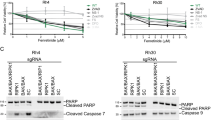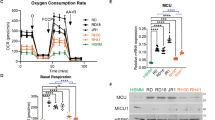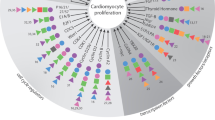Abstract
The clonal rat rhabdomyosarcoma cell line BA-HAN-1C was tested for its susceptibility to differentiation induction with different polar compounds. This cell line is composed of proliferating mononuclear tumour cells, some of which spontaneously fuse to form terminally differentiated postmitotic myotube-like giant cells. Exposure of BA-HAN-1C cells to dimethylsulphoxide (DMSO), hexamethylene bisacetamide (HMBA), sodium butyrate (NaBut) and N-monomethylformamide (NMF) resulted in a significant inhibition of proliferation (P less than 0.001) and in a simultaneous increase in differentiation. The response was most pronounced after exposure to NMF as evidenced by a marked increase in the creatine kinase activity used as a biochemical marker of differentiation (P less than 0.05) and the number of terminally differentiated myotube-like giant cells (P less than 0.001). Furthermore, about 5% of the mononuclear cells exhibited thick and thin myofilaments which were never observed in the mononuclear cells of the control. In contrast, the effects of DMSO, HMBA and NaBut were exclusively confined to a significant increase in biochemical differentiation (P less than 0.05), whereas no increase in morphological differentiation was observed and the number of myotube-like giant cells even significantly (P less than 0.001) decreased. This heterogeneous response to differentiation induction with different polar compounds probably indicates different mechanisms of action and suggests that the induction of biochemical differentiation might be independently regulated from events leading to cell fusion and terminal differentiation.
This is a preview of subscription content, access via your institution
Access options
Subscribe to this journal
Receive 24 print issues and online access
$259.00 per year
only $10.79 per issue
Buy this article
- Purchase on Springer Link
- Instant access to full article PDF
Prices may be subject to local taxes which are calculated during checkout
Similar content being viewed by others
Author information
Authors and Affiliations
Rights and permissions
About this article
Cite this article
Gerharz, C., Gabbert, H., Engers, R. et al. Heterogeneous response to differentiation induction with different polar compounds in a clonal rat rhabdomyosarcoma cell line (BA-HAN-1C). Br J Cancer 60, 578–584 (1989). https://doi.org/10.1038/bjc.1989.317
Issue Date:
DOI: https://doi.org/10.1038/bjc.1989.317
This article is cited by
-
Modulation of invasive potential in different clonal subpopulations of a rat rhabdomyosarcoma cell line (BA-HAN-1) by differentiation induction
Clinical & Experimental Metastasis (1993)



